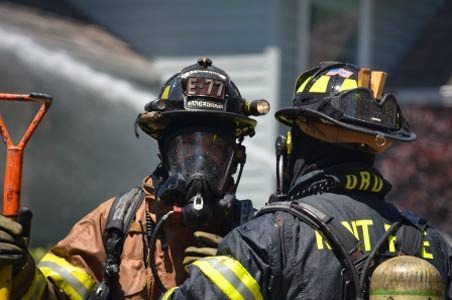The city of Kent might starting charging a fire impact fee to developers to help pay for three additional fire stations in the next dozen years to boost firefighter response times.
The City Council’s Economic and Community Development Committee meeting is scheduled to vote on the proposal at 4:30 p.m. on Monday, Aug. 24. If the three-member committee approves the fee, which would be on new developments, it goes to the full seven-member council for a vote at 7 p.m. on Tuesday, Sept. 1.
“The new (station) sites are based on future growth and development,” said Jim Schneider, chief of the Kent Fire Department Regional Fire Authority (RFA).
The RFA is planning to build stations in the Valley, on the East and West hills between 2019 and 2026 or so. The agency also proposes to close Station 75, 15635 S.E. 272nd St., in order to move the station westward closer to Kent and open another station in the southern part of Covington. Those two new stations would open in 2032 and 2033.
Fire officials approached the city about charging the fire impact fee because of its slower response times from its eight stations to handle the increases in population and traffic as congestion slows fire vehicles.
“We’re trying to keep up with current needs and look at the highest need for the next station,” Schneider said. “We’re talking years down the road when we will build the stations, but we are looking at four to meet service needs over the next 20 years, and that takes a lot of money. We’re trying to put money away in order to do that.”
Kent RFA Capt. Larry Rabel, who is helping to oversee planning for the new stations, has plenty of charts and studies that look at medical and fire response times.
“Past growth and new growth has overwhelmed our service capacity,” Rabel said. “Taxpayers would cover about 70 percent of the costs and about 30 percent would come from the impact fees (charged in Kent and Covington).”
Rabel said the additional money is needed to build the stations to provide faster response times.
“Fire impact fees are about level of service,” Rabel said. “To this point the RFA has been able to fund approximately 40 percent of the annual 20-year average capital funding needs. Without impact fees, it will not be possible to fund needed resources for future development, and consequently, overall level of service will continue to decline without them.”
The base fire impact fee for a single-family home would be a one-time cost of about $1,741. Developers would add that cost on to the price of a home. The fee for a new commercial building would be about $1.21 per square foot. The cities of Auburn, Renton, Maple Valley and Tukwila already have fire impact fees.
Ben Wolters, city economic and community development director, said at the Aug. 10 Economic and Community Development Committee meeting that the full council indicated at a recent workshop its interest and willingness to support a fire impact fee in order for the RFA to provide fire services.
“Impact fees are based on growth,” Wolters said. “We’ve seen tremendous growth in population and the need for new stations and equipment. We can collect the funds to pay for that under state law.”
Kent already charges a school impact fee to developers to help pay for the cost of building new schools to handle increases in population. The city also recently started to charge developers a transportation impact fee to help pay for road improvements.
Fire officials want to get response times down to seven minutes, 40 seconds, Rabel said. The response times have shot up to eight minutes, 35 seconds.
Councilman Jim Berrios asked Rabel at a recent committee meeting about the need for new fire stations.
“I’m trying to walk away with and understand that this is improving our overall performance – not only in saving lives – but as far as facilities if we have a fire, we are talking about eight minutes, or seven minutes,” Berrios said. “What is the critical difference between seven and eight minutes?”
Rabel was ready with his answer.
“When we look at patient survival, we’ve never saved a non-breathing patient when we arrive later than seven minutes, 40 seconds,” he said. “There would be a lot of response times less than that but we are trying to make sure we don’t go over 7:40 and are closer to seven minutes which is more likely that the patient survives.”
The city of Kent also would need to sign an interlocal agreement with the RFA. The fire department used to be part of the city until voters in Kent, Covington and Fire District 37 approved the formation of the RFA in 2010. The agency is funded through a property tax levy and a fire benefit charge, a variable rate based on the square footage and the amount of service provided to each house or business.
Fire officials said in 2010 they needed the new funding mechanism to keep the same level of service. Kent previously funded its fire department through the city’s general fund.
Proposed new fire stations:
• Benson Station
SE 217th Street and 108th Avenue SE
Estimated cost: $5 million
Potential opening: 2019
• Valley Station
407 Washington Ave.
Estimated cost: $7.5 million
Potential opening: 2021
• Riverview Station
S. 231st Way and Riverview Blvd.
Estimated cost: $4.7 million
Potential opening: 2026
• Kent, Covington stations
Station 75 on SE 272nd would close
New sites to be determined
Estimated cost: $13 million (2 stations)
Potential opening: 2032
Talk to us
Please share your story tips by emailing editor@kentreporter.com.
To share your opinion for publication, submit a letter through our website https://www.kentreporter.com/submit-letter/. Include your name, address and daytime phone number. (We’ll only publish your name and hometown.) Please keep letters to 300 words or less.

